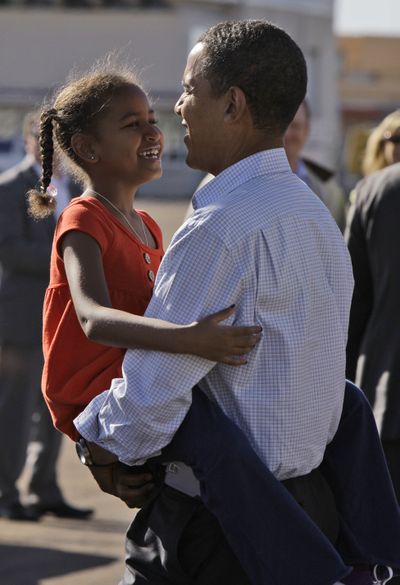Obama’s victory empowering kids
Election may make race less of an issue in American society

If Barack Obama can be president, so can Jaheer Jones.
The 12-year-old’s mom, Salema Daniels of Irvington, N.J., didn’t entirely believe that until Tuesday night, after she woke up her son and 9-year-old daughter Kira to watch Obama’s victory speech.
Tonia Ramirez of Kinnelon, N.J., brought her three school-age children into the voting booth to choose Obama. She told them how different it is from “when Mommy and Daddy were little.”
The historic event has parents and children talking of the profound change in society that has led to the election of an African-American as president of the United States; they’re also talking about their hope that children today won’t inherit the prejudice of past generations.
“This is going to have an effect on children of all races,” said Alvin Poussaint, professor of psychiatry at the Judge Baker Children’s Center and Harvard Medical School, who has written extensively on black families. “They are going to take it more for granted that a black person or someone besides a white person can be president. This in itself inspires hope for the future. Some can say I want my child to be the president, others can say they can be a doctor or a teacher.”
African-American children are going to be “incredibly empowered that someone who looks like them is now the most powerful person on the planet,” said Robert Johnson, a pediatrician and author of a book, “Strength for the Journey: A Guide for Parents of African-American Youth.”
Jaheer Jones said he believes that now, more than ever, the presidency is within his reach. Ramirez, who is white, hopes Obama’s election will shape her children’s view of the world.
“He’ll be raised seeing this diversity and acceptance of all different kinds of people,” said Ramirez, whose husband is of Puerto Rican descent.
That same sense of hope has reached even the young gang members, said Johnson, who works with troubled youths at New Jersey Medical School where he’s the interim dean.
“All these kids, even the Bloods and the Crips, wanted to talk about the election. They were watching CNN and the debates, and all the ones who could, signed up to vote. Afterwards I got text messages from all of them,” Johnson said.
“It struck me that these kids for the first time had participated in the American process. And they won.”
Poussaint and Johnson said they believe the election will inspire families to work harder for their own children’s futures.
“This should be a signal for parents to get involved in school,” said Poussaint, who co-wrote “Come on People” with Bill Cosby. “Take the long haul, just like Obama did – become more of a victor instead of a victim.”
The first family embodies that message, he said. “It’s an important image of black families: loving parents who are professionals, children who are cute and funny,” said Poussaint, who was an adviser to “The Cosby Show,” which presented the groundbreaking depiction of middle-class black families that many of today’s young voters grew up with.
For the next four years, millions of younger children will see Obama’s daughters, Malia, 10, and Sasha 7, as the first kids. To them, race may be irrelevant.
But that may create new pressures. Expecting all African-American children to reach such heights may “place a lot of burden” on them if race is considered unimportant, said Waldo E. Johnson Jr., the co-chair of the Council on Contemporary Families and a professor at the University of Chicago.
For the children who are too young to have memories of Nov. 4, 2008, many parents are determined to remind them of that historic date.
Rose Powell, 18 months, accompanied her parents, Vate Powell and Johanna Howard, who are black, when they voted for Obama in Montclair, N.J., on Tuesday. “He is her future,” Vate Powell said.
John Paul Salvatore is only 3, but his mother, Anna Salvatore of Sparta, N.J., said she has a speech planned for next year. “I’m going to tell him that barely a century ago, black people in this country were slaves, and now we’ve come so far.”
She looked down at her son. “For these little guys, race won’t be that kind of issue.”